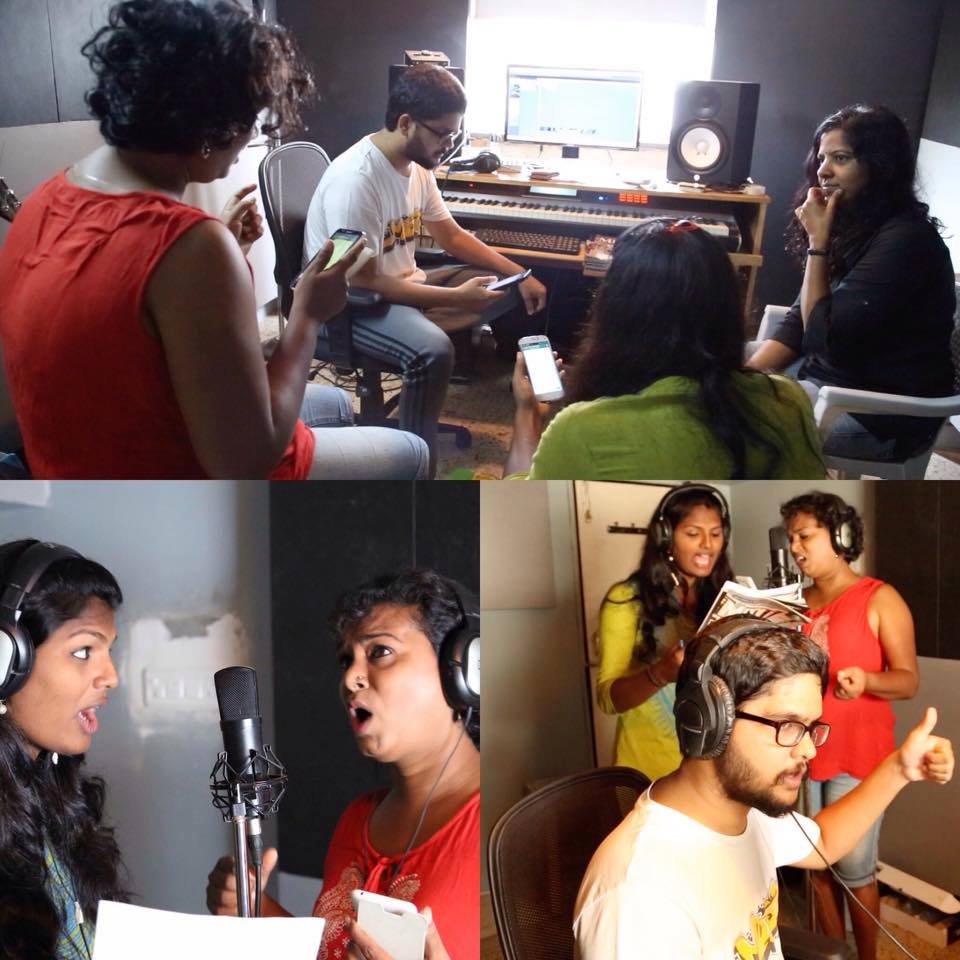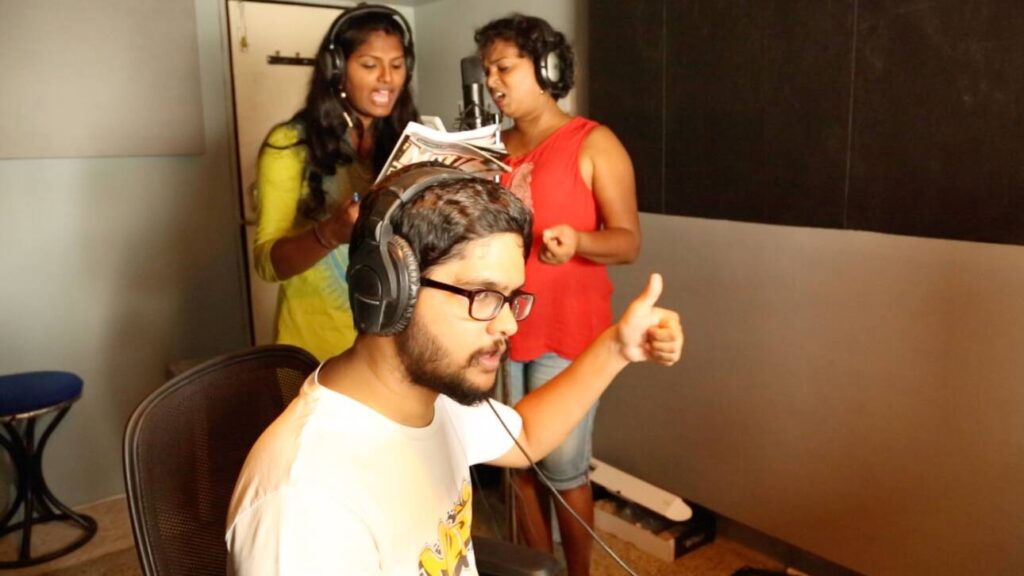My Documentary “Is it too much to ask” – Inside Lens, NHK, Japan
Check out for the first look of my latest film Is it too much to ask with all the information, trailer and my interview
Link!
http://www3.nhk.or.jp/nhkworld/en/tv/lens/

I am not interested in making a biopic of Kamala Das, says director Leena Manimekalai
| Published: 16th March 2017 06:06 PM
Kamala Das has been a recurring theme in many of artistic projects in Malayalam including the latest one Aami. Can you elaborate on your motivation behind pursuing an independent film on her?
To be honest. Kamala Das with her unrelenting life and works is a delicious cinematic subject to explore. As a Poet, she is someone I look upto and no one I knew of, had sung into subjects of polyamory and bisexuality like her. The way she did herself away with pretensions and superficialities as a Writer to understand her true self is adorable and I am interested in tracing that journey. And only an independent expression that cannot be dictated by capital and market demands can depict her restless war between passion and reason, body and soul. Her ordeal to find true love is the one line subject of my film. I will pursue making an Indie English Film, ideally an Indo Canadian Co-Production for a global audience.
You have referred to this upcoming project as an ‘ irreverent and imaginative piece’ in your Facebook post about the same. How so and in what ways?
I am not interested in making a Biopic of Kamala das. My film will be a fictional take on the life and works of the iconic writer of her times but will remain fiercely loyal to her “essence”. She says ” I have no secrets” but she also says “I am a practised teller of white lies”. I cant think of any other tool than fiction to capture an artist who is full of contradictions. She was on a constant quest for true love and her own identity. She says in her poetry that she shall serve herself in bedroom mirrors, dark fruit or silver platter. Her writing constantly strip teases our mind. For me that is a “play”. Herself and her work come together, depart, conflict, make peace, peel of the layers one by one and that magic is a perfect aphrodisiac for me as a filmmaker. And somewhere I identify myself in her purgatory. Infact many women artists who believe in “personal is political” will all have a shade of “Kamala Das” in them. Irreverence is the only tool that can do justice to her portrayal.
Your take on the relevance of such a film in a state where mere mention of female sexuality is slammed as ‘lady oriented’ and denied by the CBFC
CBFC is a sick joke of our times. Some buffoons are occupying the chairs of that useless office and they are only interested in pleasing their political masters. Such a waste of our tax money. It is high time that this archaic, regressive and colonial institution is trashed and an independent body of filmmakers, film buffs, activists and artists should be realized just to “certify” films. Every filmmaker and every viewer should know that we are constitutionally guarded by laws that provide us with complete freedom to make and watch films without censorship and state intervention. If at the age of 18, one can decide who can rule them, he or she will be capable to decide what films to watch or to reject. CBFC’s existence is an insult to common sense, to all of us.
You have mentioned about being smitten by the many contradictions that Kamala Das embodied, can you share one such instance from her life that has struck you.
Aami, Mathavikutty, Kamala Das, Kamala Suraiyya – I see all these not as her phases but bundled into one. She was an enigma far from being labelled. The distortions and queerness present in her writing is herself. She writes, “I have no joys that are not yours, no aches which are not yours. I too call myself, I” and I am interested in that “I”, the distinctive feminine voice of a Poet. Many categorize her as confessional poet and critical response to Das’ poetry has been intimately connected to critical perception of her personality and politics. As a reader, I am seduced by her intensely personal voice in her work, be it fiction or poetry and the book “Love Queen of Malabar” by Merrily Wiesberg is full of life moments that would make anyone fall in love with her. I fell like a fly in the fire of her honesty.
Your views on the portrayal of strong women characters with an evident and powerful sexuality on screen in contemporary cinema. (Any projects that you noticed on the same lines)
It is a rarity in Indian Cinema. In the recent times, I really liked the women in films like Angry Goddesses, Parched. Mainstream space is mostly infested with “Taming the shrew” kind of stuff that feeds the machismo of our heroes bigger than any frames. Recently I watched Julieta by Pedro Almadover. Sigh. Felt like we have a long way to go.
Tell us about your current projects.
Rape Nation has already sparked the curiosity of many. I just completed a documentary film “Is it too much to ask” that follows the house-hunting mission of my two friends Living Smile Vidya and Angel Glady who also happen to be transwomen. The film will have its festival rounds this year. Rape Nation is something I have been trailing since 2013. It has grown larger than my life now. The film is a theatrical non-fiction feature that captures the life and struggles of five rape survivors across the Indian Subcontinent. I shot it in Chhattisgarh, Manipur, Gujarat, Rajasthan and Kerala. I am right now editing it.
Films on Lankan war in stormy seas
March 14 2017 10:33 PM
By Gautaman Bhaskaran
The civil war in Sri Lanka was a bitterly fought one between the minority Tamils and the majority Sinhalas. The Tamil-speaking population – which has its sympathisers in the people of Tamil Nadu, bound as the two are by a common language – was demanding a separate homeland in the northern parts of Sri Lanka. For 30 years, the two communities battled, ruining the economy and causing unimaginable suffering among the common people. In the end, the Tamils lost, and their leader, Vellupillai Prabhakaran, who headed a militant organisation called Liberation Tigers of Tamil Eelam (LTTE), was brutally shot dead by the Sri Lankan army. The strife in terms of human displacement with one million Tamils now living outside their homeland, is only comparable to World War II.
But while so many films have been made about the Holocaust and the Nazi atrocities on Jews – with six million of them being killed in gas chambers – not many movies have been made on the Sri Lankan conflict. The most important reason is the intense hostility towards any such film – both from the Tamils in India and the Indian authorities. While the Tamils imagine every movie on the subject to be pro-Sinhala, the Central Board of Film Certification in India feels that any work even remotely talking about the Sri Lankan issue has the potential to create communal disturbance. Outside officialdom, Indian extremist groups are always targeting such cinema.
The famous Lankan auteur, Prassana Vithanage’s With You Without You – a really touching drama about a Sinhala soldier-turned-pawn-broker who marries a Tamil girl – was stopped from being screened in Chennai at the eleventh hour by Tamil chauvinists, who felt that the movie was pro-Sinhala. It was not. By no stretch of imagination, I would say.
Another film fighting it out is Sherine Xavier’s Muttruppulliyaa (Is It A Full Stop?). This is a 105-minute documentary that narrates the true story of a Tamil Tiger rebel who has a hard time raising her three children after the war ends in 2009. Her husband had been captured by the Lankan army.
The protagonist’s agony has been detailed in all its stark brutality in a movie which also explores the horrid plight of hundreds of women desperately searching for their missing husbands. There is a lot of real footage with recreated sequences.
The documentary was ready in 2015, but it took years for Xavier to get an Indian censor certificate. Exhibition in Sri Lanka is out of the question. Now armed with Indian rights, Xavier’s search for a distributor has begun. There is none to be seen even on the horizon, for theatres know that they will receive threats from fringe groups once a release date is announced. No cinema is willing to see vandalism on its premises.
Another fiery filmmaking activist is Leena Manimekalai. In 2003, she began making documentaries, and it was one such project which took her to Dhanushkodi – on the island of Rameswaram – that was wiped out during a severe cyclone in the early 1960s.
“I thought I would do a documentary on Rosemary, a character who appears in my fiction feature, Sengadal (2011)”, Manimekalai told me in the course of a chat in Chennai. “I began my project in 2009 – the year the 30-year ethnic war in Sri Lanka ended. I had been a part of the Tamil resistance movement in Chennai. I will call myself pro-Tamil, but not pro-LTTE. So you find yourself in a no-man’s land, and you are at once seen as an enemy.”
This is one reason why Sengadal or Dead Sea attracted problems. “But I was fascinated by the stories of Sri Lankan Tamils who had suffered at the hands of both the country’s predominantly Sinhala military and the dictatorial attitude of the LTTE. One of them, Rosemary, was the widow of a Tamil fishermen who was killed by the Sri Lankan Navy. She then landed in the refugee camp at Dhanushkodi. There are 300 families there even today. And Rosemary helped me discover the distraught families. When I found that each one of them had a story to say, I decided that I must cross over to the realm of fiction to narrate something powerful. Sengadal happened,” Manimekalai said.
She had a massive issue with the Censor Board before Sengadal got a screening certificate. But, of course. She wondered why when there are so many movies on the Nazis and Jews, we should be so touchy about the Sri Lankan Tamils. A million of them were displaced during the war, and there are so many stories to be told about them.
Sengadal, Prasanna Vithanage’s With You Without You and Jaques Audiard’s Dheepan – which won the Palm dÓr last year at Cannes – are perhaps three of the very few films on this subject.
Manimekalai is planning two movies – one on the controversial Kerala poet, Kamala Das (whose conversion to Islam caused a lot of ill-feeling towards her), and the other titled Sunshine – a story about the tragedy of the cargo ship, Sun Sea, which sailed with 492 Sri Lankan Tamils from Thailand to Canada, but was not allowed to dock. A lot of people died. The year was 2010, and there was a lot of worldwide suspicion about Sri Lankans. It was assumed that most of them were LTTE rebels.
Be that as it may, Manimekalai seems all set to sail on one perilous journey after another, passionate as she is with opening the Pandora’s Box of heart-wrenching tales of simple suffering folks from an island nation.
Bringing into focus a forgotten crisis
K. Ajith Kumar
KOZHIKODE, MARCH 14, 2017 20:45 IST
UPDATED: MARCH 16, 2017 19:10 IST
Leena Manimekalai is all praise for women’s film fest held in Kozhikode
In 2010, a cargo ship named Sun Sea landed in troubled waters in Canada.
The ship, with 492 Sri Lankan Tamils on board, had reached British Columbia from Thailand after a voyage of three months. Their detention of the asylum-seekers was criticised by the Amnesty International. Leena Manimekalai is making a film on that incident. She will begin shooting Sooryaregai (The Sunshine) later this year.
“Talks are also on with International producers. S.R. Prabhu is the Indian producer.”
It is the poet-director’s second feature film. Her first, Sengadal, was screened before a full house at the Women’s International Film Festival, which concluded here last weekend. “I am glad that the Kerala Chalachitra Academy and the Federation of Film Societies of India decided to organise a film festival for women,” says the Chennai-based director.
“It was nice to meet other female film-makers and to see so many women in the audience. This was certainly one of the best screenings Sengadal, which I made in 2011, has ever had in Kerala.” The film was about the plight of the fishermen of Dhanushkodi. “Nobody seems to care about those people even now,” she says. “In virtually every family you meet there, there would be men who have been killed or jailed in Sri Lanka.”
She had hit the headlines a fortnight ago when she said that director Kamal was planning to make an English film on Kamala Das in which she was supposed to play the bilingual author.
“It was after a lot of deliberation that I decided to write about it on my FB page,” she says. “I don’t know what is happening with Kamal’s film in Malayalam. Yes, I have heard that Vidya Balan backed out of it. I will start my film on Kamala Das right after I complete Sooryaregai.”
At the moment, she is busy giving finishing touches to her documentary, The Rape Nation.





